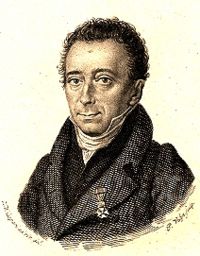Samuel Iperusz Wiselius
| Samuel Iperuszoon Wiselius | |
|---|---|

Portrait by H. W. Caspari after being knighted in 1815
|
|
| Committee on the East-Indies Trade and Possessions |
|
|
In office 1796–1801 |
|
| Personal details | |
| Born | 4 February 1769 Amsterdam |
| Died | 15 May 1845 Amsterdam |
| Nationality | Dutch |
| Political party | Patriottentijd |
| Parents | Iperus Wiselius |
| Alma mater | Leiden University |
| Occupation | Lawyer, writer, historian and police commissioner. |
Samuel Iperuszoon, Knight Wiselius (4 February 1769 – 15 May 1845) was a successful Dutch lawyer and a prominent Patriot and democrat, involved in the dismantling of the Dutch East India Company (VOC) and the negotiations over the Cape. Wiselius was a witty, Voltairian spirit with political views far ahead of his time who would end his days writing dramas on Classical themes. ... Wiselius corresponded with nearly all the main players at the time of the Batavian Republic and it would be impossible to know that period completely without his carefully kept and neatly written correspondence. He was also a poet, historian and superintendent of the police.
Samuel was born in Amsterdam, the only son of the oil merchant Iperus Wiselius, himself a Patriot and a captain in the civic guard, promoted to colonel in May 1787. He grew up on Nieuwezijds Kolk, probably the oldest spot in the city centre. Samuel studied law and classics on the Athenaeum Illustre. In 1786 he travelled to Franeker, and showed his essay on dismissing the local militia in 1650 to Johan Valckenaer and Theodorus van Kooten, then progressive professors at the local University. Although the article went missing, the friendship remained, when the three took a prominent role in the country's future after the year 1795.
Samuel had to write a new thesis and obtained his doctorate from Leiden in 1790. He immediately became a lawyer at the Council of Holland, which also served as a court of law. In 1791 Wiselius was the founder of the brotherhood of l'Infanterie des Cinq Sabres ("Infantry of the Five Sabres") at Leiden, a flirtation with freemasonry. (Mozart had gained great success that year with his masonically-inspired opera The Magic Flute). Wiselius moved with his family to Amsterdam in a house at Prinsengracht, across the Noorderkerk. He had full house in 1793 with three lectures for the society Doctrina et Amicitia in the Kalverstraat. Wiselius proclaimed that the French Revolution signalled a radical new beginning. No longer was it necessary to take heed of the heavy burden of the past, he argued, but the future could be based on development and progress.
...
Wikipedia
